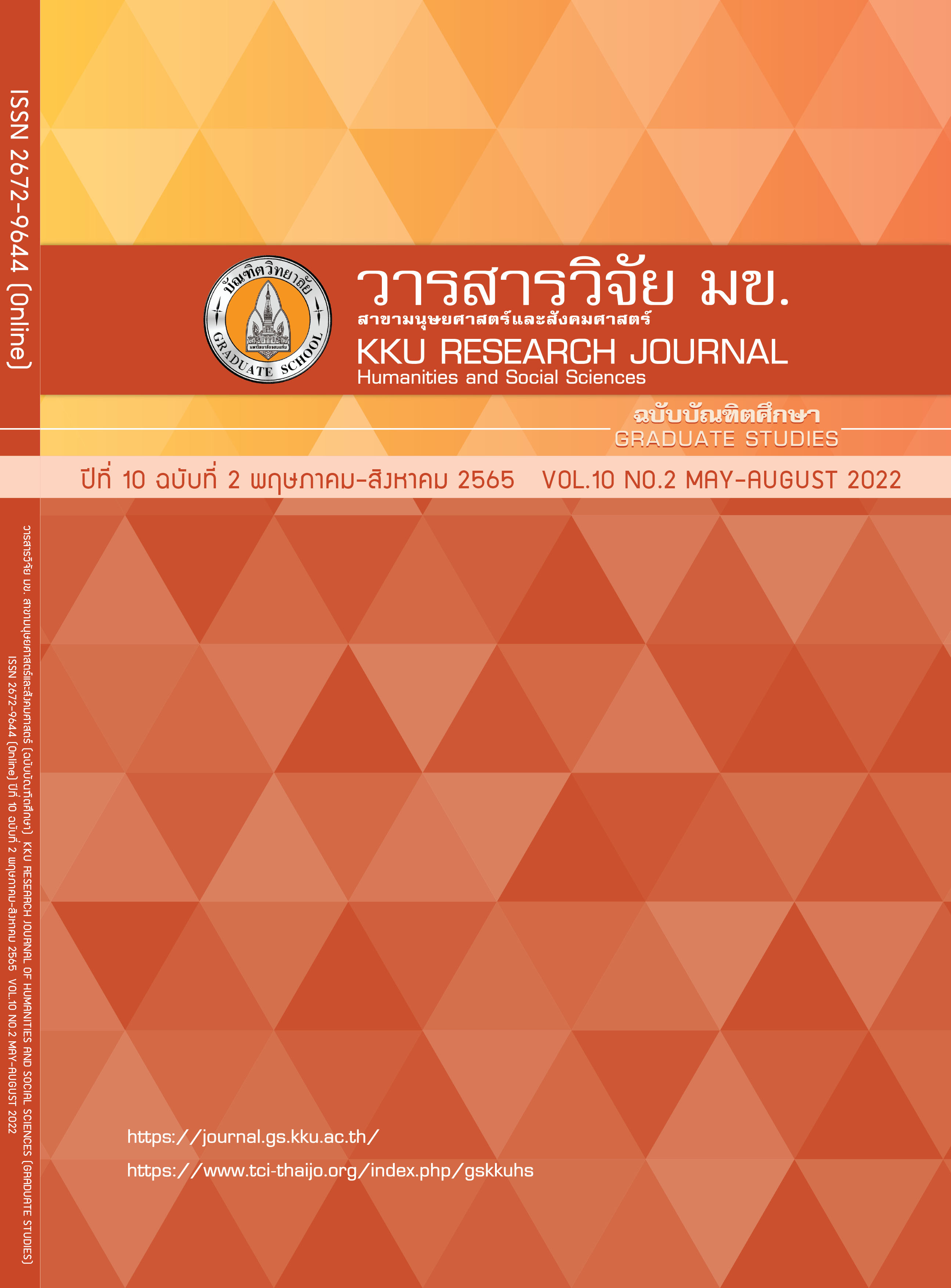The Effects of the Using the GPAS 5 Steps Teaching Model Online on Analytical Thinking Ability and Satisfaction with Learning Management of Sixth Grade Students
Keywords:
GPAS 5 Steps teaching model online, Analytical Thinking Ability, Satisfaction with learning managementAbstract
The purposes of this research were 1) compare analytical thinking ability for seventh grade students before and after learning management by using the GPAS 5 Steps teaching model online and 2) indicate students’ satisfaction toward learning management by using the GPAS 5 Steps teaching model online. The sample in this research consisted of 20 Sixth Grade Students. Cluster random sampling technique was employed for selecting; the classroom was a random unit. In addition, The instrument used in research consist 1) learning management plans 2) Analytical Thinking Ability test and 3) a scale to assess students’ satisfaction with learning management by using the GPAS 5 Steps teaching model. The findings were as follows: 1) The students’ abilities in analytical thinking ability for Sixth Grade Students after learning management using the GPAS 5 Steps teaching model online higher at the .05 level. And 2) The students’ satisfaction toward learning management by using the GPAS 5 Steps teaching model online were positive at a highest ( = 4.09, S.D = 0.73)
References
The institute for the Promotion of Teaching Science and Technology (IPST): Skills and Mathematical Process. 3th ed. Bangkok: 3-Q Media; 2012.
Makanong A. Mathematics for Teachers. 2th ed. Bangkok: Chulalongkorn University Book Center; 2014.
Lamlert S. Effects of Mathematics Learning Activities using Rigorous Mathematical Thinking and Scaffolding Approach on Mathematical Concept and Problem Solving Ability of Ninth Grade Students [MSc thesis]. Bangkok: Chulalongkorn University; 2015. Thai.
Thirakulnanchai S, Laorpaksin J. Effects of Organizing Mathematics Learning Activities using 7E Learning Cycle and Higher Order Questions on Mathematical Problem-Solving Ability of Seventh Grade Students. An Online Journal of Education. 2020; 15(2): 2-3. Thai.
Cheausuwantavee C, Nillapun M. The Development of Mathematics Instructional Model to Enhance Higher Order Thinking and Habits of Mind of Secondary School Students. Silpakorn Educational Research Journal. 2013; 5(2). Thai
The Ministry of Education. The Basic Education Core Curriculum B.E. 2551 (A.D. 2008). 3th ed. Bangkok: The Printing Press of the Agricultural Co-operative Federation of Thailand; [n.p.].
Khankhou N, Nontapa R. A Study of Guidelines to Develop Analytical Thinking of 3rd Grade Students. The 8 th NEU National Conference 2021 (NEUNC 2021); 2021.
Sternberg R J. The concept of intelligence and its role in lifelong learning and success. American Psychologist. 1997; 52(10): 1030–1037.
Nakornthap A. Passion for Learning. Walailak Journal of Learning Innovations. 2016; 2(1): 11. Thai.
Sinlarat P, Chaowakeratipong N, Chindanurak T, Sutthirat C, Fakkao S. Analytical Thinking: How to teach and create. Bangkok: Chulalongkorn University Book Center; 2014.
Marzano RJ. Designing a New Taxonomy of Educational Objective. Thousand Oaks. California: Corwin Press; 2001.
Bloom BS. Taxonomy of Educational Objectives, the classification of educational goals – Handbook I: Cognitive Domain. New York: McKay; 1956.
Susaorat P. Develop thinking. 8th ed. Bangkok: 9119 Technic Printing; 2013.
Wongsaphan M. Raising the level of student learning through analytical thinking processes. Journal of Education Thaksin University. 2013; 13(2): 125. Thai.
Anderson LW, Krathwohl DR. A Taxonomy for Learning, Teaching and Assessing: A Revision of Bloom’s Taxonomy of Educational Objectives: Complete Edition. New York: Longman; 2001.
Reilly DE, Oermann MH. Clinical Teaching in Nursing Education. Bosten: Jones and Bartlett; 1999.
Office of the Permanent Secretary for Education [Internet]. 2021. [updated 2021 November 12; cited 2021 December 25]. Available from: http://www.onec.go.th/onec_main/ page.php? mod=Book&file=view&itemld=1044
Office of the Education Council. Second decade of education reform (2010 - 2018) [Internet]. 2021. [updated 2021 November 12; cited 2021 December 25]. Available from: http://www.onec.go.th/onec_main/page.php?mod=Book&file=view&itemld=1044
Chanthaburi Primary Educational Service Area Office 1. Student Quality Assessment Report, Academic Year 2017; 2018 November 11.
Academic Department of laemsingwittayakom school [Internet]. 2021. [updated 2021 November 12; cited 2021 December 25]. Available from: https://data.bopp-obec.info/web/ ?School_ID= 1022060016.
Sithsungnoen C, Nilapun M, Po Ngern, W, Poomraruen A. The effect of using the model to enhance the quality of teaching Based on learning according to GPAS 5 Steps to enhance students’ learning skills in Thailand 4.0 of the elementary education. Journal of Research and Curriculum Development. 2021; 11(1). Thai.
Jerry E. A Process for Effective Graphic Design Curriculum Development. Dissertation Abstract International. 1996; 11(4): 4254–A.
Costa AL, Kallick B. Discovering and Exploring Habits of Mind. Alexandria. VA: Association for Supervision and Curriculum Development; 1997.
Robin F. Problem-Based Learning and Other Curriculum Models for the Mutiple Intelligences Classroom. USA.: Skylight; 1997.
Institiute of Academic Development (IAD). GPAS 5 Steps Learning Management Training Document. Bangkok: Institiute of Academic Development (IAD); 2013.
Vanichwatanavorachai S. Differentiated Instruction. Silpakorn Educational Research Journal. 2016; 4(2).
Nillapun M. Educational Research Methodology: Research Design. 9th ed. Nakhon Pathom: Campus Educational Research and Development Faculty of Education Silpakorn University; 2015.
Wiratchai N. Linear Structure Relationship model (LISREL): Statistical analysis for social and behavioral research. Baangkok: Chulalongkorn University Printing House; 1994.
Saiyot L, Saiyot A. Measurement and Evaluation Techniques. Bangkok: Chomromdek; 2000.
Education Research Development and Demonstration Institute. Educational Innovation. Nakhon Nayok: Srinakharinwirot University Ongkharak; 2012.
Bandura A. Behavior Modification Through Modeling Procedures: In Research in Behavior; 1965.
Bergin A. E. Some implications of psychotherapy research for therapeutic practice. Journal of Abnormal Psychology. 1966; 71(4): 235–246.
The institute for the Promotion of Teaching Science and Technology (IPST) [Internet]. 2021. [updated 2021 November 20; cited 2021 December 25]. Available from: https://data.bopp-obec.info/web/ ?School_ID=1022060016.
Kowtraku S. Educational Psychology. 9 th ed. Bangkok: Chulalongkorn University Book Center; 2010.
Pongpat W. The development of mathematics learning achievement on probability. By learning management in GPAS 5 Steps at the level of Mathayom 3, WatSrisuttharam School. SamutSakhon Province. Online journal for graduate study, Faculty of Education; 2018.
Thepprasit W, Thepprasit R, Muakul k, Lebkrut H. 5 Steps Learning Process Using eDLTV Media to Develop Mathematics Subject Learning Achievement. Kasalongkham Research Journal Chiangrai Rajabhat University. 2017; 11(3), 157-162.
Downloads
Published
How to Cite
Issue
Section
License

This work is licensed under a Creative Commons Attribution-NonCommercial-NoDerivatives 4.0 International License.




